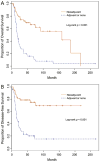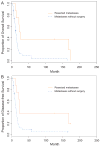Neoadjuvant chemotherapy in small cell urothelial cancer improves pathologic downstaging and long-term outcomes: results from a retrospective study at the MD Anderson Cancer Center
- PMID: 22564397
- PMCID: PMC3815632
- DOI: 10.1016/j.eururo.2012.04.020
Neoadjuvant chemotherapy in small cell urothelial cancer improves pathologic downstaging and long-term outcomes: results from a retrospective study at the MD Anderson Cancer Center
Abstract
Background: Small cell urothelial carcinoma (SCUC) is a rare, aggressive malignancy with a propensity for early microscopic metastases. Data suggest that neoadjuvant chemotherapy may lead to improved survival compared with initial surgery.
Objective: To determine the influence of neoadjuvant chemotherapy on survival of SCUC patients in a large single-institution cohort.
Design, setting, and participants: Between 1985 and 2010, 172 patients were treated for SCUC at MD Anderson Cancer Center (MDACC). Clinical, pathologic, and surgical data were collected and analyzed.
Outcome measurements and statistical analysis: Overall survival (OS) and disease-specific survival (DSS) were calculated using the Kaplan-Meier method. Multivariable Cox proportional hazards models were used to evaluate the effects of neoadjuvant chemotherapy on survival.
Results and limitations: Of 125 patients with resectable disease (≤ cT4aN0M0), 95 were surgical candidates. Forty-eight received neoadjuvant chemotherapy, and 47 underwent initial surgery. Neoadjuvant treatment was associated with improved OS and DSS compared with initial cystectomy (median OS: 159.5 mo vs 18.3 mo, p<0.001; 5-yr DSS: 79% vs 20%, p<0.001). Neoadjuvant chemotherapy resulted in pathologic downstaging to ≤ pT1N0 in 62% of tumors compared with only 9% treated with initial surgery (odds ratio: 44.55; 95% confidence interval, 10.39-191). Eight patients with clinically node-positive disease had surgical consolidation with cystectomy and extended lymph node dissection after clinical complete response to chemotherapy. Median OS and DSS in this group of patients were 23.3 mo and 21.8 mo, respectively, with 5-yr OS and DSS of 38%.
Conclusions: Neoadjuvant chemotherapy is associated with a high rate of pathologic downstaging and correlates with significantly higher survival compared with historical expectations. Although limited by a small sample size and retrospective analysis, in the context of a rare disease, this experience suggests neoadjuvant chemotherapy as a standard approach in treating SCUC.
Keywords: Bladder cancer; Chemotherapy; Neoadjuvant; Small cell urothelial cancer; Surgery.
Copyright © 2012 European Association of Urology. Published by Elsevier B.V. All rights reserved.
Figures



References
-
- Quek ML, Nichols PW, Yamzon J, et al. Radical cystectomy for primary neuroendocrine tumors of the bladder: the University of Southern California experience. J Urol. 2005;174:93–6. - PubMed
-
- Siefker-Radtke AO, Dinney CP, Abrahams NA, et al. Evidence supporting preoperative chemotherapy for small cell carcinoma of the bladder: a retrospective review of the M. D. Anderson cancer experience. J Urol. 2004;172:481–4. - PubMed
-
- Cheng L, Pan CX, Yang XJ, et al. Small cell carcinoma of the urinary bladder: a clinicopathologic analysis of 64 patients. Cancer. 2004;101:957–62. - PubMed
-
- Holmäng S, Borghede G, Johansson SL, et al. Primary small cell carcinoma of the bladder: a report of 25 cases. J Urol. 1995;153:1820–2. - PubMed
-
- Blomjous CE, Vos W, De Voogt HJ, Van der Valk P, Meijer CJ. Small cell carcinoma of the urinary bladder. A clinicopathologic, morphometric, immunohistochemical, and ultrastructural study of 18 cases. Cancer. 1989;64:1347–57. - PubMed
Publication types
MeSH terms
Grants and funding
LinkOut - more resources
Full Text Sources
Other Literature Sources

